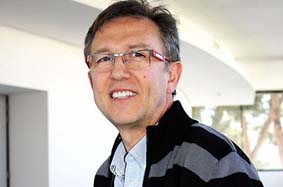
The European Research Council (ERC) has awarded, again, the full university professor of Inorganic Chemistry Eugenio Coronado (Institute for Molecular Science) with one of if projects of excellence. This time he was granted the ‘Proof of Concept’, modality oriented to implement the ideas born in projects which were funded by the same organisation. The grant will be destined to the development and preparation for the market of supercapacitors for the quick storage of energy.
A supercapacitor is an electrochemical capacitor with an extraordinarily high density of energy, that is to say, a device able to store and provide energy very quickly. The supercapacitor developed by Coronado’s team in the Institute for Molecular Science of the Universitat de València (ICMol), is made of materials based on graphene and magnetic nanoparticles, combination which allows its high performances and efficiency.
Six years ago and for this development, the ERC gave the same scientist one of the most prestigious research grants, the ‘Advanced Grant’. Now, the ‘Proof of Concept’ is the last boost that Eurpean Council gives to this project of scientific excellence, so that the team develops and prepares the new hybrid supercapacitors for its application in the market.
Eugenio Coronado performs most of his work in the Institute for Molecular Science of the Universitat de València (ICMol), in the Science and Technology Park, which he directs since its foundation in 2000. Apart from accumulating a great numbers of Research awards -Rey Jaime I Prize, National Prize for Chemistry, National Rey Juan Carlos I Prize, and International Chain Blaise Pascal, which he currently has-, his name appears in the committees of outstanding scientific organisations from all around the world, like the European Institute for Molecular Magnetism, of which he is the director.
Coronado has made two scientific milestones in the fields of nanoscience, nanotechnology and molecular magnetism. On the one hand, his team designed the first molecular materials in which, for the first time, magnetism and electric conductivity, two properties with technological interest, coexist. This finding, published in ‘Nature’ in 2000, had a great impact in the international scientific community, being called “a hybrid material that opens a new frontier in molecular spintronics”. His second research pillar is the design of molecular nanomagnets that can act as magnetic memories and also present quantic effects. Both lines, which open interesting application possibilites in Molecular Spintronics and in new quantic information technologies, are part of the strategic lines that the ICMol will develop for the next four years in the framework of the Unit of Excellence ‘Maria de Maetzu’, with which the Institute was recently awarded.
In this edition, the European institution has given 135 grans of 150,000 euros to researchers selected among institutions from 17 European countries. United Kingdom (22 grants), Spain (20), the Netherlands (17) and Germany (15) are the four countries with more grants in this call.
Last update: 25 de january de 2016 11:55.
News release


















